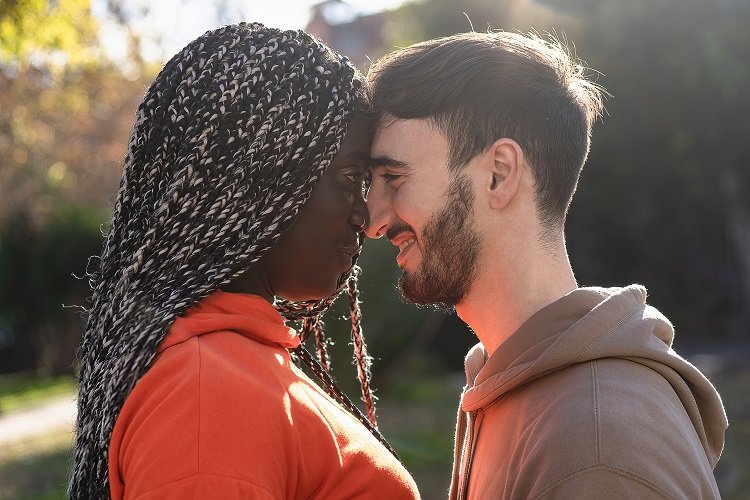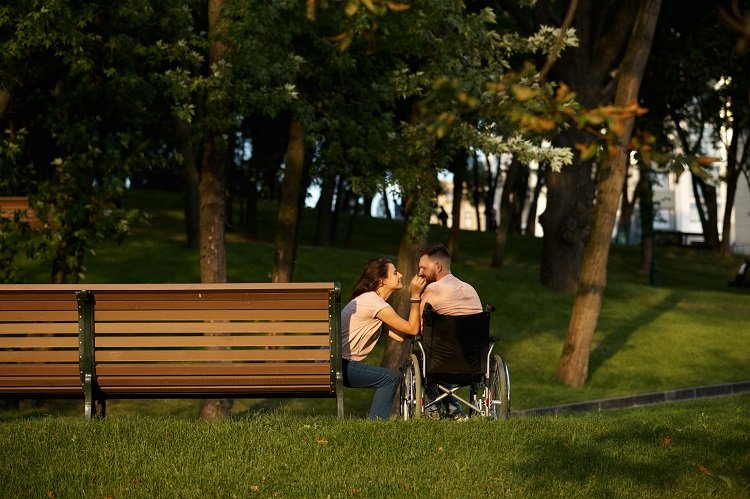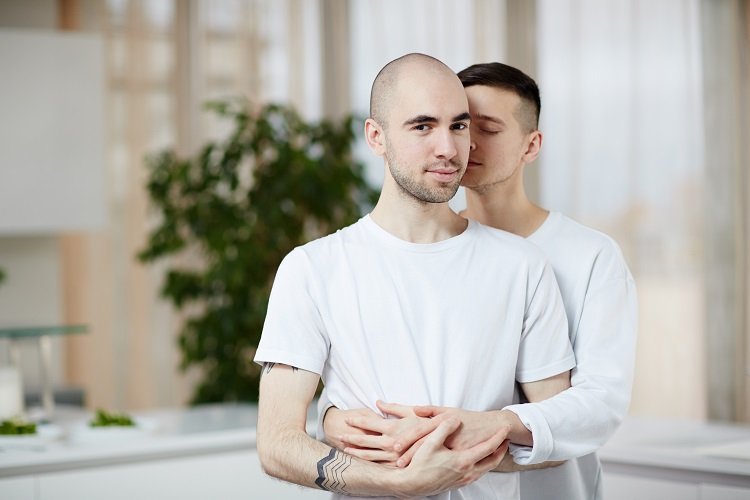In today’s post, we’re looking at the question of what is the meaning of love in a relationship.
At a base level, love can be described as a feeling of strong emotional attachment or admiration and caring for someone or something.
Love is often described as a strong attraction that two people feel for each other or it can also be used to describe how someone feels about an object, such as a pet or a hobby.
But, what is the meaning of love in romantic relationships really?
And how are we to understand it in order to know how to develop healthy relationships or grow a couple’s life?

These are all important questions for us to consider because they can help us create a stronger, more meaningful bond between two people.
More importantly, we know that lasting love involves more than just strong feelings of affection; it also requires trust, respect, and commitment if we want to create a healthy relationship that includes intimacy, sexual desire, positive emotions, warm feelings, and healthy communication, plus good mental health.
When all of these elements are present, relationships tend to be more stable, happy, and lasting.
So, with that in mind, let’s first consider,
The Importance of Love
People need love, according to Tony Robbins, a world-renowned life coach who is also a relationship expert, and love can lead to some extraordinarily fulfilling relationships.
As Leo Tolstoy said,
“Love is life. All, everything that I understand, I understand only because I love. Everything is, everything exists, only because I love.”
Leo Tolstoy
However, when love, as their primary human need, becomes a distorted or imbalanced view of reality, it can cause a person to sacrifice self-care in order to take care of others or maintain a relationship.
Some people often sacrifice self-care when caring for others, ignoring their own needs and focusing solely on the needs of others in order to meet their own need for love.
This can easily lead to fatigue and burnout, as well as bitterness towards those for whom they are responsible.

So, while love as a primary human need is one of the most important emotions we must experience in order to live a fulfilling and happy life, it must be balanced with other human needs such as the need for certainty (security, predictability) or significance (self-esteem, self-worth).
It is a basic human need, like air, water, and food, and it is critical to our mental and physical health because it allows us to feel connected, supported, and appreciated.
It is possible, however, to turn love into a double-edged sword when one begins “chasing” it as a means of filling oneself rather than as a natural result of feeling a strong emotional connection with someone else, and all of the subsequent feelings and behaviours that follow from that.
Without a doubt, healthy relationships cannot exist in the absence of love; however, love is only one of our primary human needs, albeit an important one.
Having said that, are there different kinds of love?
If love is necessary for healthy relationships, what kind of love are we discussing? Or are we referring to all of them?
When considering the meaning of love in a relationship, I believe it is essential to consider the type of love we are discussing since every type of love can contribute to a relationship in a unique way.
But what do I mean by different types of love?
Well, according to the ancient Greeks, there are various types of love, each with its own focus, traits, and dimensions.
We’ll briefly look at 8 different kinds of love, and what they may mean for you.
The Different Types of Love According to Ancient Greeks
There are different types of love according to ancient Greeks.
Philia – Affectionate, Friendly Love
Philia is a deep, emotional love that is often described as brotherly or sisterly love.
This type of love is usually based on a strong emotional bond and is often characterized by a sense of loyalty and friendship.
Philia can be seen as a secondary love if one chooses to place it on the chart.
Philia does not lend itself to charts that emphasize attraction or sexual energy.
It is based on compassion and is often described as warmth and caring.
Storge – Unconditional, Familial Love
Storge is a type of love that is based on familial or close friendship bonds.
It is characterized by its strong, unconditional nature.
This type of love is often seen as the glue that holds families and close friends together.
Storge is all-encompassing and has the capacity to bring out the best in others.
Agape – Selfless, Universal Love
Agape is a selfless, universal love that is often associated with religious or spiritual concepts.
It is typically used to describe a deep, unconditional love for others, and is often seen as a higher form of love than other types of love such as eros or philia.
Agape can be directed toward all of humanity, or even towards inanimate objects or animals.
Ludus – Playful, Flirtatious Love
Ludus is a type of love that is characterized by playfulness and flirtation.
This type of love is often seen in new relationships or in relationships that are still in the early stages.
Ludus love is often light-hearted and fun, and it does not usually involve any deep or committed emotions.
Eros – Erotic, Passionate Love
Passionate, erotic love is often characterized as being all-consuming, intense, and all-encompassing.
This type of love is often associated with strong physical and emotional desires and attachments.
This type of love can be both exhilarating and exhausting, as it often requires a high level of commitment and energy.
Pragma – Committed, Enduring Love
Pragma is a committed, long-lasting love that is not based on passionate love but on mutual respect, trust, and understanding.
Philautia – Self Love
Philautia is a Greek word that means self-love.
It is the love of oneself for one’s own sake.
It is different from narcissism, which is self-love that is based on an inflated sense of self-importance.
Philautia is healthy self-love that is based on a realistic appraisal of one’s own worth.
But which “love” or “true” love should we seek?
I believe most of them.
Yet, I could also argue that the most important type of love we should seek in a relationship a bit more is unconditional love.

This means that we should love our partners no matter what they do or say.
We should be accepting of them and always be there for them.
But that doesn’t change the fact that love is far more complex than one dimension and is always a synthesis of various experiences and feelings.
What is The Meaning of Love in a Relationship
Everyone experiences and defines love in their own way.
However, some psychologists believe that love is composed of three main components: intimacy, passion, and commitment.
Intimacy refers to the feeling of closeness and connectedness that two people share, passion is the physical and sexual desire that a couple feels for one another, and commitment is the decision to remain together in the relationship long-term.
But, love is different for each person and even in the same relationship at different times.
For some, love might be having someone to confide in or go on a walk with.
For others, it might be holding hands or spending time together.
Literature is also full of examples of famous people and their descriptions of love.
In Shakespeare’s “Romeo and Juliet”, Juliet defines love as a kind of madness: “I can speak of love… a madness / So beautiful, so violent, / It makes the blood come burning.”
Leo Tolstoy wrote,
“When you love someone, you love the person as they are, and not as you’d like them to be.”
Leo Tolstoy
In Ernest Hemingway’s novel “The Sun Also Rises”, Jake Barnes describes love as a “beautiful and terrible thing,” but it is not until the end of the book that he is able to define it.
The end of the novel contains a discussion between Jake and Bill Gorton on love after Jake describes to Bill how he thought falling in love with Célestine was the most beautiful experience of his life.
Bill responds by telling Jake that it is not until later in life that one understands love.
“That’s all very fine,” Jake replies, “but what the hell does it mean?”
Bill says, “Love means understanding the imperfections of another and still wanting to trust him.”
Love, in other words, is being able to see the other person’s inner beauty even when they can’t see their own.
But, who’s correct in their meaning of love?
Well, all of them.

Psychological research has found that love is a complex emotion that can be felt in different ways.
It is often described as a feeling of strong attachment, warmth, and happiness.
A common definition of love is a “state of deep attraction based on sexual desire.”
Most theories of love identify some version of the “love prototype,” a concept proposed by Robert Sternberg in 1985.
According to Sternberg, the love prototype is an abstract model of what a loving relationship should be.
Sternberg differentiates among three types of love: sexual passion; tender, protective, and egotistical “romantic love”; and a third type that he calls “intimacy love,” which combines the other two.
Helen E. Fisher asserts that,
“There are three distinct types of love: lust, romantic love, and long-term attachment. Each is associated with a unique neurotransmitter and is hardwired into the brain.”
Helen E. Fisher, PhD
Love is also seen to be a combination of cognitive and physiological reactions, and many behavioural experiments have been conducted in an attempt to quantify love.
One such study measured brain wave activity in people experiencing different kinds of romantic love.
The results were that brain wave activity (using an electroencephalogram) showed different kinds of activity in the brains of the participants.
The study concluded that there are different types of brain wave activity that can be used to identify different types of romantic love.
The point is that it appears that the definition of love is as varied as the people who study or ponder on it, although there seem to be overlapping elements.
But, is there a distinction between being in love and loving someone, because not only do the two appear to be easily confused, but they also appear to have a lot in common?
And they are obviously not the same.
The Difference Between Being in Love and Loving Someone
Having been in love and still loving someone, I believe there is a significant difference between being in love and loving someone.
Fundamentally, being in love is an intense feeling of passion and admiration for someone.
It is often accompanied by strong feelings of happiness, joy, and excitement due to a plethora of brain chemicals being released during the infatuation stage, which is normal and true for most people.
There are various brain chemicals that are associated with the infatuation stage of love: dopamine, oxytocin, vasopressin, P.E.A., and norepinephrine.
These are also the same brain chemicals that are released during a drug or alcohol high.

Dopamine is a neurotransmitter that is involved in the control of movement, emotional responses, and motivation.
Oxytocin is a hormone that is involved in social bonding, sexual reproduction, and childbirth.
Vasopressin is a hormone that helps to regulate blood pressure and water balance in the body.
P.E.A. (phenylethylamine) is a neurotransmitter that is involved in the regulation of mood and emotion and is thought to be involved in the “feel good” response that people experience when they are in love or when they are experiencing other positive emotions.
Norepinephrine is a neurotransmitter that is involved in the control of heart rate and blood pressure.
Now, while the infatuation stage of love is common and everyone experiences it, once the chemistry and excitement begin to fade, the initial intoxication dies down (or recovers to normal levels), and the relationship either evolves to more or dies altogether.
If it evolves into more, loving that person often becomes a more likely result.
To be clear, loving someone does not preclude strong feelings of excitement, joy, sexual desire, or passion, but it also goes beyond that. It is also more than that.
Loving someone is often a gentler and more compassionate emotion.
Rather than being driven solely by intense emotions, it is often more about caring for someone and wanting what is best for them.
It all comes down to dedication and commitment, perhaps the long-term attachment Fisher mentioned earlier.
For me, the biggest difference between being in love and loving someone is that being in love is a feeling while loving someone is an action.
Being in love is an emotion that is often associated with infatuation and is often based on physical attraction.
Loving someone, on the other hand, is a decision to care for and commit to someone, even if neither you nor they are perfect.
Conclusion
The key conclusion regarding the meaning of love in a relationship is that it is a profound and lasting feeling of affection and admiration for someone, frequently accompanied by intense emotions of happiness, joy, and passion, as well as behaviours that demonstrate commitment and compassion.
Having said that, the advice to “find the right person and love them for the rest of your life” has never been more relevant.
I would suggest that it is critical for someone looking for love to recognise that being in love is much more than being infatuated or thinking someone is “the one.”
It is about understanding the meaning of love and how it may be fostered into a healthy, long-lasting relationship.
Thus, to conclude this article, let us define love as an interpersonal relationship in which two individuals have intense feelings for one other, as evidenced by devoted acts and dedication to each other’s and the relationship’s well-being.
Question – what is the meaning of love in a relationship for you?
How do you think about love, what do you believe about love, and what love are you striving for?
Let us know in the comments below.



A lot of us are in connections with the people we love, but as humans, now and also, there is a bit of mistrustfulness as to the true nature of effects. We’ve each been there at some point, really. A love relationship is a true relationship. Love does not lie. When you are in love, your conduct shows it. Then are 9 further signs that show one is in a relationship with true love.